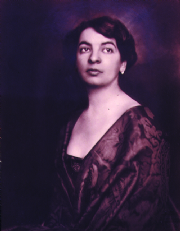Dora Pejacevic
Countess Maria Theodora Paulina "Dora" Pejacevic (10 September 1885 – 5 March 1923) was a Croatian composer, pianist and violinist and one of the first composers to introduce the orchestral song to Croatian music. Her Symphony in F-sharp minor is considered by scholars to be the first modern symphony in Croatian music. Pejacevic is noted for her vocal compositions, piano miniatures, and string quartets, which were heavily influenced by the expressionist and modernist trends of the time.
In her early career, Pejacevic’s primary themes were highly representative of the Romantic period, but this would change after her experience working as a paramedic in the First World War after which her works reflected the philosophic movement of nihilism and discussed motifs of death, isolation, and futility of war.
On 14 September 1921 she married Ottomar Otto, Ritter von Lumbe (1892–1978), son of Franz, Ritter von Lumbe (1848-1920), great-great son of Count Franz von Thun und Hohenstein (1786-1873) and his wife, Countess Theresia Anna Maria von Brühl. The couple soon moved to Munich and had their first child, which proved to be fatal for Pejacevic. She died of puerperal sepsis after childbirth on March 5, 1923, at the Munich Clinic for Women’s Diseases. Her son, Theodor von Lumbe (1923-2012) survived and in July 2011 in Vienna, he presented the 1917 portrait of his mother - seated with violin - by Maksimilijan Vanka to the Gallery of Modern Art in Zagreb, Croatia.














 My Wish List
My Wish List












